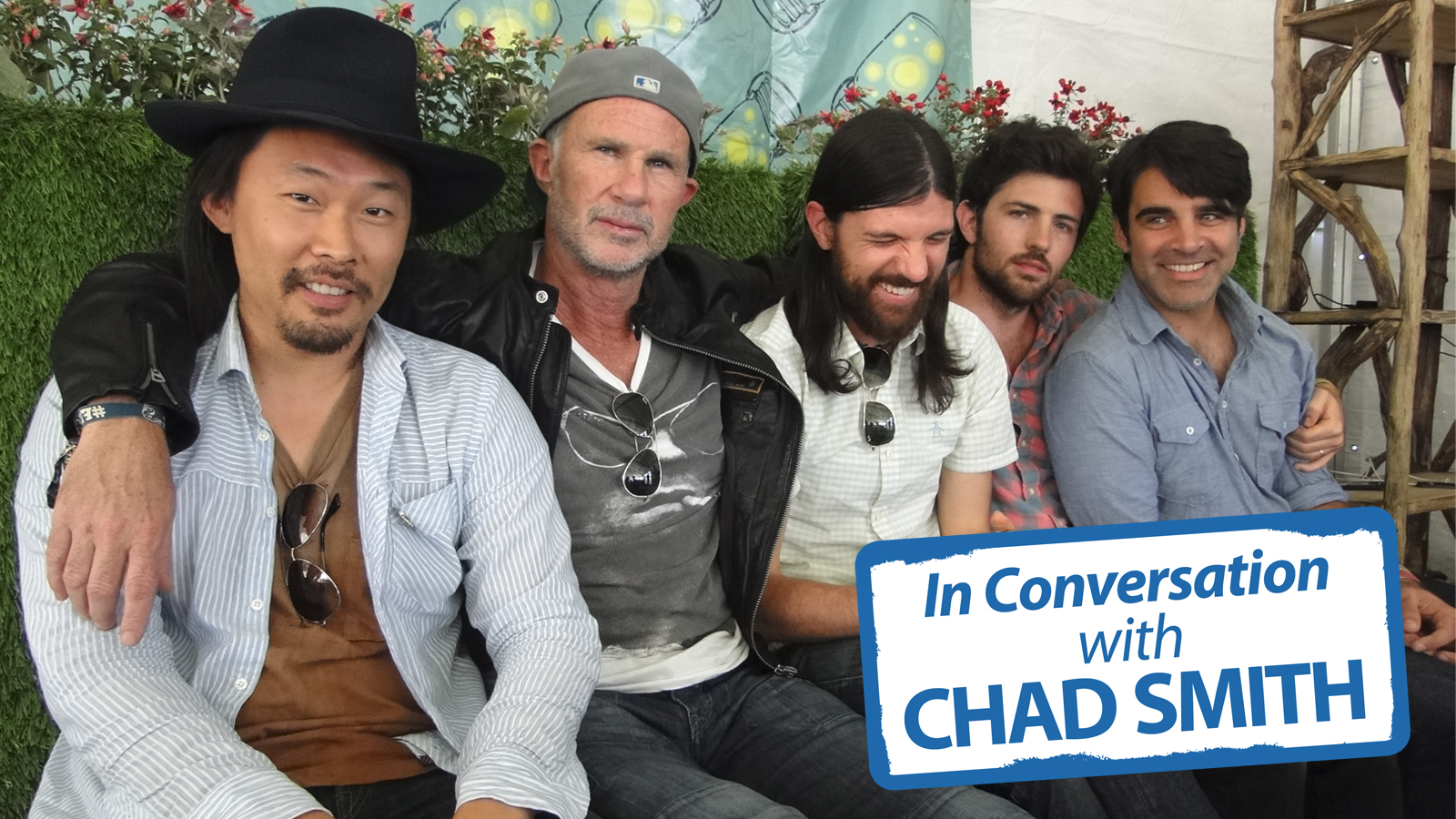
Want all the hottest music and gear news, reviews, deals, features and more, direct to your inbox? Sign up here.
You are now subscribed
Your newsletter sign-up was successful
It's hot and sticky, and the late-afternoon sun is beating down big-time for the start of the three-day Firefly Music Festival in Dover, Delaware. The Red Hot Chili Peppers aren't due to take the stage till well after nightfall, but Chad Smith has jetted in early. The superstar drummer is looking forward to catching the 7pm set by The Avett Brothers, and although it's still a well-guarded secret, he'll even join them tonight for a deliciously unhinged reading of their art-rock gem, Paul Newman Vs The Demons.
The enterprising sticksman, seemingly oblivious to the heat (he sports a well-worn leather jacket, along with jeans and an extra heavyweight T-shirt), zips into the backstage artist tent area on a golf cart. Turns out, he has other Avetts-related business here today, such as sitting down with the North Carolina sensations for a new edition of his MusicRadar podcast series, In Conversation.
Smith got his first chance to hang with the Avetts in the studio, when he played on their remarkable, soul-nourishing 2012 album, The Carpenter (which, like its predecessor, I And Love And You, was produced by the Chili Peppers' longtime boardsman, Rick Rubin), but over the course of the next 90 minutes, in a cozy corner of the Firefly Artist Compound, he'll get to know the enormously talented and immensely likable modern Americana superstars (frontmen Scott and Seth Avett, bassist Bob Crawford and cellist Joe Kwon) a whole lot better.
Despite the sultry air, it's a party-like atmosphere backstage - Frisbees are tossed, soccer balls are kicked and head-butted, and the catering staff is moving a trainload of Red Bull and vodkas - and the hoots and hollers will ultimately play havoc with our digital recorder. While security staffers kept the revelers at bay, Smith and the Avett Brothers settle back to swap stories about this business of music.
Special thanks to Laura Glass, Kimberly Harris, Dane Honeycutt, Joe Burke, Patrick Janes and Gordon Bathory.
In Conversation: Chad Smith with The Avett Brothers will be presented in two installments. Part One begins below:
Edited transcript:
Want all the hottest music and gear news, reviews, deals, features and more, direct to your inbox? Sign up here.
Chad Smith: When was the last time you guys were in a fight? [They all laugh.]
Scott Avett: Last week.
Seth Avett: Me and Scott got in a fight earlier today.
Scott Avett: We didn't come to blows.
Chad Smith: You guys look OK. No cuts, you're still walking around. Well, brothers…
Seth Avett: A fight used to be something that probably any young male can relate. Used to be something on Friday night, you'd go out and think, "Getting in a fight would be something normal. It would be OK."
Chad Smith: And they do.
Scott Avett: Every year that passes, you're like, "Whatever I've got to do to stay out of a fight, I think I'd like to do that."
Seth Avett: I'm at the point now where I'll just flat run from a fight. If there's anybody around, I'm not going to get embarrassed.
Chad Smith: It's not worth it. Back in my drinking days... that doesn't help. When you play in bars and people are aggressive, there should be a way to not do it.
Scott Avett: There should be a way to not fight. You're saying that drinking can sometimes aggravate it. I think that might be a bit of an understatement. I wonder how many actual fist fights that happen every Saturday night in this country... I wonder how many would happen if there was no drinking involved.
Chad Smith: Yeah, because you're making bad decisions.
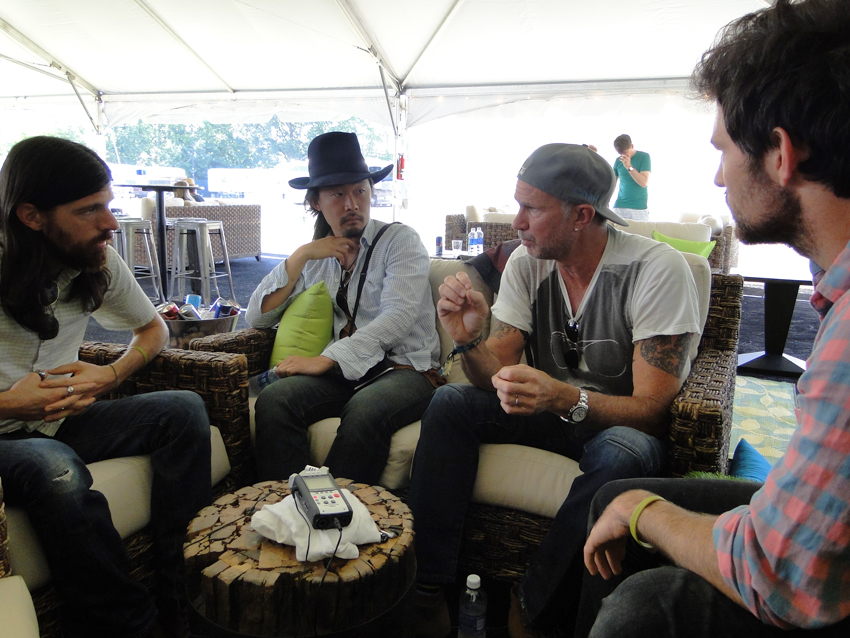
Seth Avett, Joe Kwon, Chad Smith and Seth Avett © Joe Bosso
Scott Avett: You're taking things seriously you ought not to take seriously, feelings getting hurt, whatever.
Chad Smith: It's not worth it.
Seth Avett: Not that any of us are going to make any more bad decisions.
Chad Smith: No, we'd never do that. Let's talk about a little bit how I know you guys, and we know each other. Start off from our mutual friend, Ryan Hewitt. Ryan engineered... did he engineer the whole record?
Scott Avett: Yeah, the last two records for us.
Chad Smith: The last two records. Actually, you told me before, he was like, "You gotta play with these guys. These guys are great." Just really telling me how great you guys were. For whatever reason in my schedule, I couldn't do it. I think he was doing it down in your neck of the woods, right?
Scott Avett: Yeah, we were doing it in North Carolina. You did it later.
Chad Smith: I came later. It sometimes happens. There was a few tracks that we wanted to put drums on, and so we went to Malibu. I don't do it a lot. I'm not saying it's weird to play after all the music's done. As you guys know, at least for me and those bands that play together, it's really... First of all, the music was so good. I was very happy to be playing with such good music. The songs really, to me, were really easy to play to. It just was a real natural fit, and the groove was really good. It was really easy. There was no laboring over it, like, "What part should I do?"
Scott Avett: Yeah, that's what Ryan said.
Chad Smith: Ryan was just like, "Do your thing, yeah." We cranked it out. I think that says something about the songwriting and the way you guys put the songs together. It was a real honor for me to be part of it. I loved the record, almost as much as my kids. [They all laugh.]
Seth Avett: We just broke the record, right?
Chad Smith: Yeah, I think I sent you that video of my three-year-old. Yes, he's singing along in the car seat. That was the go-to album when I was taking him to school. And, of course, Rick Rubin. How'd you guys hook up with Rick?
Seth Avett: You're making me thinking about... I always visualize things and think, "Wow, this metaphor this-and-that." I think about compost, when you're trying to plant a garden, all the things that mix up and marinade for years or whatever. I'm thinking about, we were kids growing up on the Chili Peppers. Teenagers... along with a lot of other records... were part of it. That's part of our sensibility, and the making of the marinade.
Over the years, I can't help but believe that there's... I'm not talking about magic here, but I'm just talking about the making of what we are. It would be natural that you would probably... or we would all kind of see something the same way. Because we all, for whatever reasons, have traded and come from some of the same places. Us, we're obviously in a different generation, but definitely products in many ways of some of the things you were making along the way.
That's really interesting, meeting Rick, and him being moved by anything we did. We did... of course at first, you're just like, "That's great, this is such an honor" and everything. Then you got in there and started working with him, you realize, "We're also comrades." We actually see a lot, see eye-to-eye. This isn't about, "One dude's done this, and he gets this praise, and we get this." It's like, "Hey, we all have a common interest here. We like making common things. What's going to happen to the stew that we're making?" I think that helps with the natural vibe, as far as us all working together.
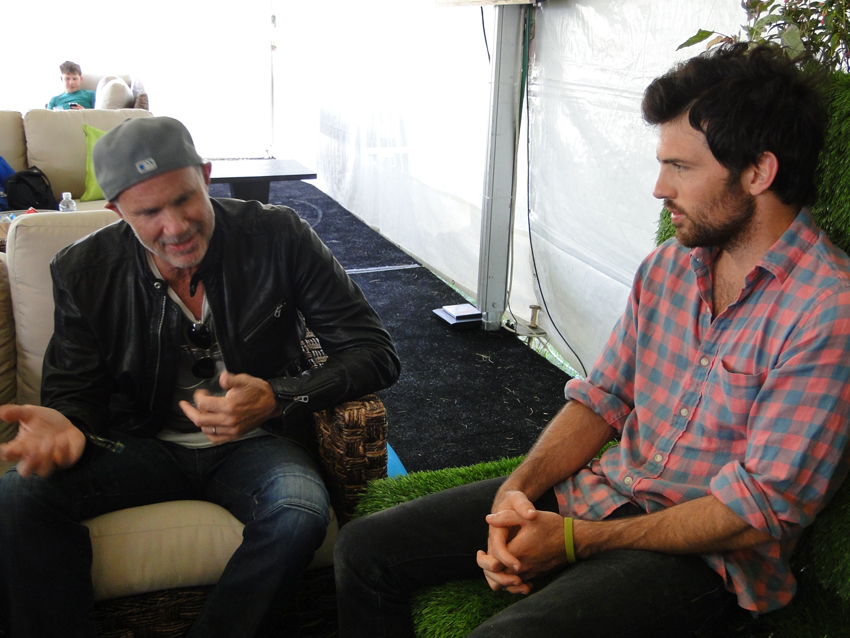
Smith and Scott Avett © Joe Bosso
Scott Avett: Two things on that, yeah. I think it would be unavoidable to notice that what you've done some in the past would be a part of our vocabulary; just part of your treatment, part of your groove, that has become part of our vocabulary. That helps towards a good melding. Yeah, while you're talking about how you don't love to do it afterwards; you'd rather, if you can, find this thing together, get in a room together. It wasn't possible because of scheduling and lives and everything being crazy in that regard.
It would be an interesting thing; since it went so well musically, you've got to wonder, in a lot of scenarios, would that be indicative of a good, sitting- in-a-room kind of thing? You've got to wonder, if the chemistry's so obvious right off, musically, you've got to wonder, are these people all on the same wavelength in their conversation and their chemistry all around?
Chad Smith: I think so. Sounds like it to me. I think it would work.
Seth Avett: It's interesting, what it all boils down to - making any art, really.
Scott Avett: We're lucky that we had a full record experience with Rick before you did a couple with us. Because there was sort of a breaking down and rebuilding during our first experience with Rick. I think tempo was a big part of that. That helped, getting a little bit of experience with Rick under our belts, and dealing with him again.
Chad Smith: What do you think... I'm interested to see, because I have a lot of history with him, obviously. What do you think his best attributes are, as a producer? See if they're similar to mine.
Seth Avett: Yeah, yeah, yeah. I was just thinking tempo-wise, we came from a place where we were playing hard rock, something like melodic hardcore and melodic punk rock. We broke it down to where it started with the banjo and guitar. For tempo, we were doing just the hi-hat drum, because we were playing on the street.
Chad Smith: Can I ask you where that…
Scott Avett: That came from the punk sound. It was driving front, back. It started with backbeat.
Chad Smith: How'd you get stuck with the backbeat?
Seth Avett: That's just what I'm natural to. It's really lucky that Scott actually feels the front beat, because I just feel the backbeat. I was basing it off of, oddly enough, no bluegrass or anything like that. I really need to find out for sure, but I think the Zeppelin song is called Out On The Tiles.
Chad Smith: No, I know the one you're talking about. Out On The Tiles is "da, nah, nah, nah... " I know the one. [Sings the drum pattern.]
Seth Avett: [Sings] "Where you're smiling at me, that's the way it should be, like a leaf is to a tree... "and there's that big kick drum. We listened to a lot of Zeppelin. When we first started playing this, just acoustic instruments, I was hearing that song and I was like, "Man, our feet are moving anyway. Put something underneath it, make it more rapid."
Scott Avett: Make more racket on the street - that was the thing. That's what we were interested in.
Seth Avett: We got that going. We added Bob very early on. Over the years, me and Scott and Bob, we created our own rhythms. Within songs, there would be so many rhythm changes, and we just became one voice. Just the three of us became one rhythmic voice. That one rhythmic voice was something that, when Rick first heard it, he loved the songs, but he was like, "This is a little bit confusing at times, because you all get it, but no one else does."
Scott Avett: Who cares? [They all laugh.]
Seth Avett: That was our attitude.
Chad Smith: That must be, "You know what? We've got something different going on."
Seth Avett: That was always our attitude. It's always worked up until now, so that was a major element when we were trying to figure out how to make it not just digestible, make it more understandable for anyone that would hear our songs, to be open to the songs. We're going to have confusing things happen rhythmically.
Scott Avett: He helped us kind of stop and breathe a little bit. "There's a deadline. Let's start thinking in professional terms." Professional meaning - "Let's get it right."
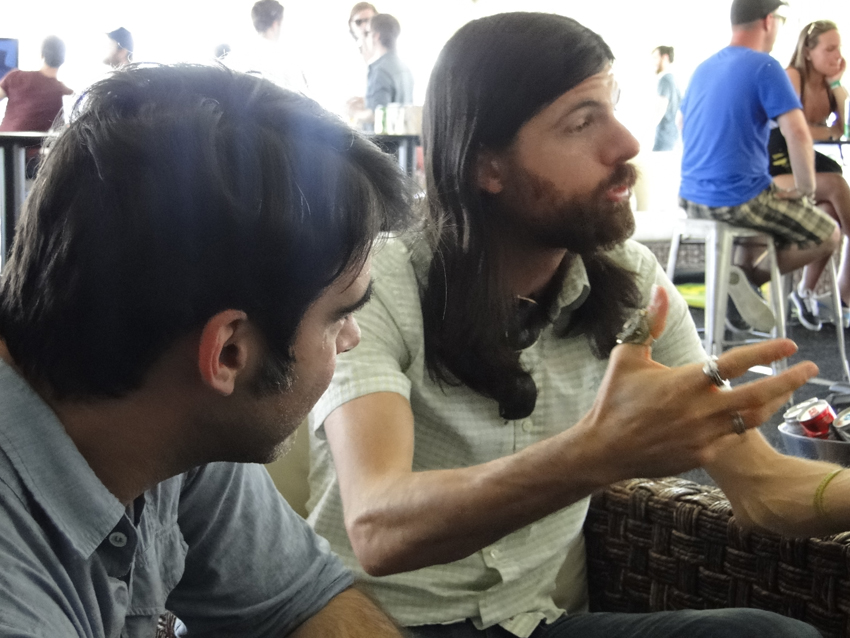
Bob Crawford and Seth Avett © Joe Bosso
Seth Avett: Asking "What is one of the most important attributes for Rick as a producer?" That's up there: slowing down. Saying, "Hey, let's take our time. Let's get it right. Let's find out what works the best, and not stop until we do." That was very important for us.
Chad Smith: He does that. To me he's, 20-whatever years now... 23 years? I've just watched him grow as a person and as a producer.
Seth Avett: Yeah, it's got to be interesting for you, if you've known him so long.
Chad Smith: We knew him as... we were beginning our Blood Sugar record, and we leaving our label, EMI, and we were looking for record companies. We met with like every record company. Rick had American Recordings. We went out to lunch. We knew him, but we knew him as like the guy from Slayer and with what he'd done with Run DMC and his records - Aerosmith, that "Walk This Way" thing. We were like, "I don't know about his label." We felt like maybe it was too small of a label. We kind of wanted to go with a little bigger label.
He said, "If you don't sign with American, I'd still like to produce you." We thought about that, and obviously we ended up working with him. At that point, we were really wanting to go fast and hard.
Scott Avett: Very highly charged, right?
Chad Smith: [Laughs] Yes, very highly charged. He helped us, kind of like you said, the songwriting. I think our songwriting started to mature a little bit more. We had to be better songwriters. Myself and John had been in the band now; we'd toured together on Mother's Milk, and we wrote all the songs for Blood Sugar together. He just... a lot of our songs come from jams. Our songs would be, like, really long [laughs]. We'd be like, "OK, this part would go eight times, and this part would go whatever." He was really good... the first person who really helped us picking out what was really important.
Scott Avett: A great editor, right?
Chad Smith: He was a great editor and really good with arrangements. He still does that to this day. He's toned his craft and his skill so well, working with so many different types of artists. We like everything, and he loves everything, too. He's such a fan. He's such a music fan. He doesn't get bored; he doesn't come from an engineer background, he doesn't really play guitar. He just knows what he likes, and he's really good at finding what the essence of a good song is, and what you bring to him. Having that objective take on it, where you know when you're in a band, and you're writing a song for six months or however long, you're kind of married to it.
Seth Avett: You think it's all great. You want the whole thing in there [laughs].
Chad Smith: I can't tell you how many times we're, "Wait until you hear this. This is the fucking greatest thing." He'd be like, "What else you got?"
Seth Avett: What do you mean, "What else you got?" [Laughs]
Chad Smith: "This is the shit!" Then we'll play, "Ahh, there's this thing we jammed on Tuesday …" We just have this one part and maybe this other thing. He's like, "That's great. We've got to make a song." We were ready to throw it away. It's great to have that objective, unemotionally attached thing.
Seth Avett: The "I and me" thing... taking the "I" out of team. It's like he helped us remove the individual from it. It's the whole. We've got to be working with more; it's got to be all about making this great piece.
Chad Smith: He doesn't care where it comes from. It's just, whatever's the best thing for the whole and for the band. He's really focused and gets really better at it. He's working all the time, with every type of genre. It's just incredible. Yeah, that makes sense that you say that. That's been his strong point and has continued to be.
Seth Avett: When you all started, was he more, "We should do it like this, guys"? Over the years… When we went into it, we were "How do you explain working with Mars Volta, The Chili Peppers, the Beasties and Johnny Cash? How does that work? Is it your stamp?" I was trying to get a bead on it, what we were in for. He said, "You know, 15 years ago I would have gone into some of these sessions and said, 'We've got to do this, we've got to do that, and we'll try this.' Now, I wait because I know every single individual; they each take their own approach." He said, "I'm much more of a listener." Have you noticed that change in him? Or was it always there?
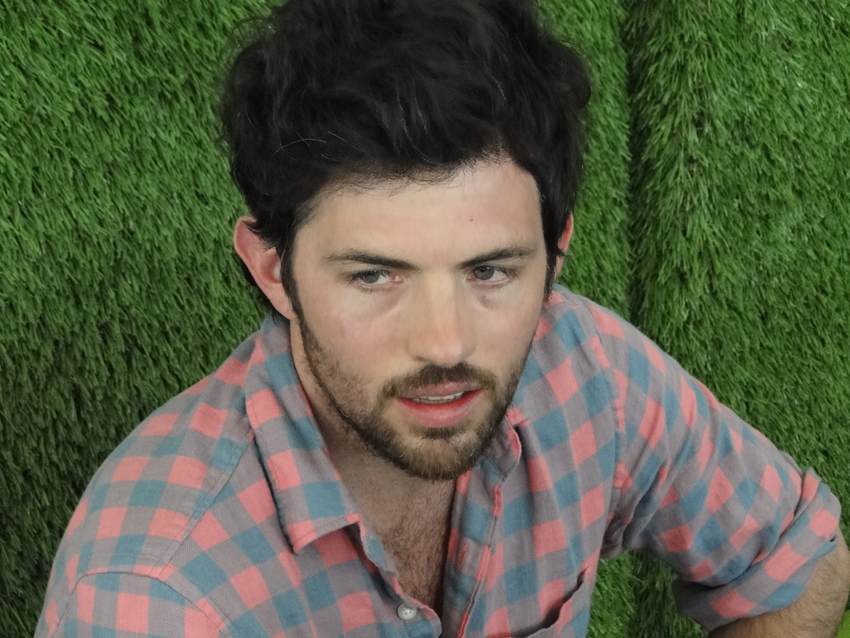
Scott Avett © Joe Bosso
Chad Smith: Yeah, I can't… It's interesting, because it's always kind of been his technique, I guess. He's always been more of, like you said, a listener. Yeah, more laid back. Some people that have never worked with him before, they're like... I saw Tony Iommi from Black Sabbath, the guitar player; I saw him at Lolapalooza last year, and I asked him, "How's it going with Rick?" He's like, "I don't know. He kind of sits on the couch, and doesn't really say much. I don't really know."
Scott Avett: I saw the same thing with an interview with Metallica. They were like, "It's good when he's there; he's not really there much."
Chad Smith: Some people are used to like, "No, this is B flat here, and then a turnaround." Rick is really absorbing everything, in Rick's way, which is usually horizontal on the couch [laughs]. You don't think he's listening, and we're playing. We'll finish, and he'll talk back. "I think the second chorus, a turnaround - do you always do that? Maybe you should do half as much." I'm like, "Fuck!"
Seth Avett: I thought for sure I was going to sneak that past him [laughs].
Chad Smith: I thought I got away with something. "Think more AC/DC." He's like focused. It's interesting.
Scott Avett: It's more like not so much what is... it's just what jumps out to him; what jumps out as unnatural.
Chad Smith: Yes, what breaks up the groove. It's all about the groove.
Scott Avett: What takes you out of the groove.
Chad Smith: What takes you out of the groove - exactly. How did you do pre-production type stuff?
Scott Avett: We did demos.
Chad Smith: You would send him demos?
Scott Avett: Yeah, those we did together, at his house in the living room.
Seth Avett: Yeah, that's the biggest part. The first record was like these sketches that were not inventoried or edited. The pieces were like...
Chad Smith: Yeah, yeah, he makes you better with things like that.
Seth Avett: He totally organized us in that way, and it's been great.
Chad Smith: Who played first? How did you pick up the banjo?
Scott Avett: We both started with piano. Dad said, when we were younger, he was like, "Do you want to play guitar?" Everybody wanted to play guitar. He was like, "If you want to play guitar, you've got to learn piano."
Chad Smith: Your dad's a musician?
Scott Avett: Yeah, he's a guitarist and a singer and a songwriter. He's out there playing. When we were kids, he was a welder. He loved music.
Chad Smith: I remember you telling me that, yeah.
Scott Avett: He had a welding business; it was denim and burn holes on his shirt. We had friends that didn't have a pick-up truck. If they didn't have a pick-up truck, or their dad didn't have a pick-up truck, we were like, "What's wrong with your dad? Why are you driving a station wagon?"
Chad Smith: Come on - all dads have pick-up trucks.
Scott Avett: Where's his gloves, you know? He kind of got us going. We both played guitar. Seth was more of a disciplined… he practices and trains. He took to guitar playing. I was kind of like, "I got this." [Laughs] I was by myself on stage like, "Ohhhh, what have I got to do?"
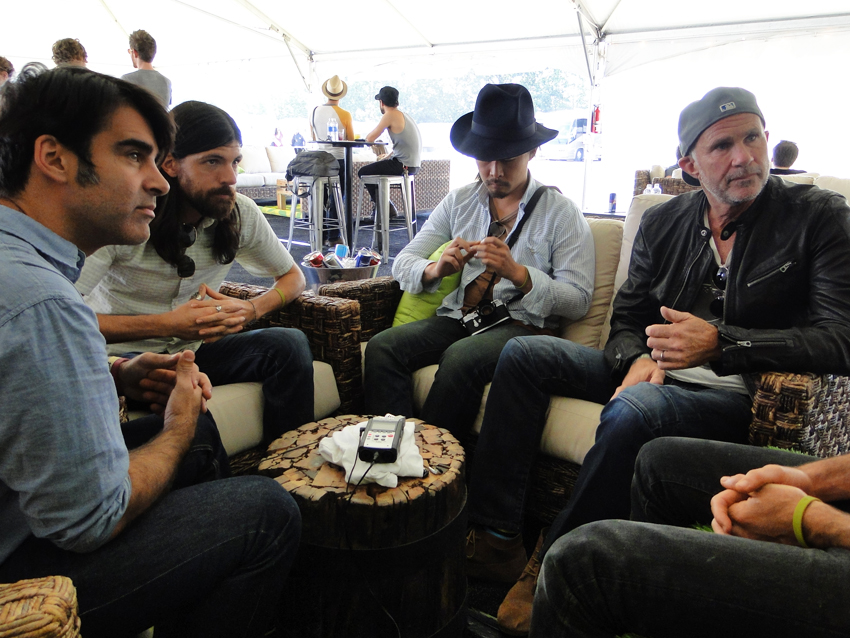
Bob Crawford, Seth Avett, Joe Kwon and Smith © Joe Bosso
Chad Smith: He's going, "This is the chord…"
Seth Avett: And Scott's going, "No, no, no. I'm not worried about the chord, but if I stand like this, and if I can get this right…" [Laughs]
Chad Smith: "I'll look fucking cool. No one is going to fucking know."
Scott Avett: "And I'm going to get this leather jacket, and I don't need another chord."
Chad Smith: "What chord? Fuck the chord!" He wasn't even playing the guitar - it was like a prop.
Scott Avett: That's what I was about. We played some of the rock band stuff. We were art students, and we had this band. Nobody played like that in the group we were around, and so we started this Tuesday night thing while we were in art school with some other guys that were hacks, punk-rock guys that played mandolin. None of us know it; we were just discovering Ramblin' Jack Elliot, Doc Watson - all this old stuff that was punk rock in spirit… This was original punk rock. That was so awesome, when you started kind of measuring yourself. "What can I do on the street? What have we got?" We're cutting down that five-piece rock band.
Chad Smith: It's raw and naked.
Scott Avett: Lyrically, it's naked. Lyrically, you no longer could hide behind distortion and volume.
Seth Avett: It could be two guitars, because everybody was a singer/songwriter. Once you get out of the rock realm and go to coffee shop, it's like what's going to bring the banjo into something much more vital. I tried to play.
Chad Smith: Good enough! Good enough.
Seth Avett: Each thing was enough to get us to the next thing. And then we met Bob. Bob was from Jersey - he'd been everywhere.
Chad Smith: Bob from Jersey. "I'm all the way over here.' What did you think of these guys when you first saw them?
Bob Crawford: I met them at a Media Play parking lot.
Chad Smith: A what?
Bob Crawford: It was like a record store; a big box record store. They got out of the car, and they were wearing cut-off shorts and flannel shirts. I didn't know what to think. I was told that they were bluegrass.
Chad Smith: What year is it?
Bob Crawford: 2001. I was told they were bluegrass.
Chad Smith: Had you heard of the Avett Brothers at this point?
Bob Crawford: I was at the first gig. I heard that these guys, this bluegrass band, needed a bass player. I was looking for a job. We just got out in the middle of the parking lot and started playing.
Chad Smith: In the parking lot? Begging for money?
Seth Avett: We were just playing; we played some songs in the parking lot.
Chad Smith: Really? You played songs in the parking lot?
Bob Crawford: Then we just parted ways. We played five songs and said, "OK, talk to you later."
Chad Smith: What song? A cover song?
Bob Crawford: No. I mean, we did some originals. We did Kind Of In Love, which was an original.
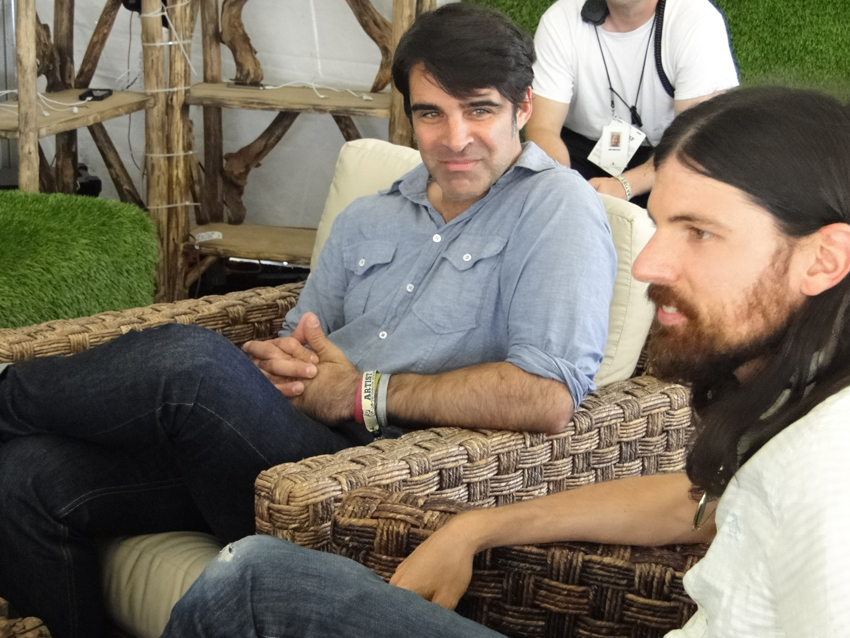
Bob Crawford and Seth Avett © Joe Bosso
Seth Avett: Some of the songs that we had written and produced.
Bob Crawford: We did Worried Man Blues - Woody Guthrie. Maybe one of the Ramblin' Jack songs.
Chad Smith: Did you know that stuff?
Bob Crawford: Not particularly. I knew how the progressions would go. I knew of Woody Guthrie and that stuff; I didn't know every song that they played.
Scott Avett: Let's be clear about one thing. Bob from Jersey was doing a little bit of hustling. He, on a stand-up bass, was very new, right?
Bob Crawford: Yeah, I just got the stand-up bass.
Joe Kwon: He kind of hustled these guys, like "I'm a stand-up bass player."
Seth: We're like, "Well, he's got a stand-up bass, I imagine he's a stand-up bass player."
Bob Crawford: There is a saying: "Lie and apply."
Chad Smith: Lie and apply!
Scott Avett: That's kind of where we were.
Seth Avett: Ironically, similar to Scott. We agreed.
Bob Crawford: Practice. A bunch of hacks.
Scott Avett: There's no doubt. These guys were riding my coattails all along.
Bob Crawford: I need G, C and D.
Scott Avett: How much more do you need?
Chad Smith: There's a lot of songs that are only 12 notes. You played in a parking lot…
Bob Crawford: Then I didn't hear from them for like a month.
Scott Avett: We left for this trip. We played with him and decided to go live the Woody Guthrie lifestyle. We got a station wagon and drove all the way to California, played wherever we could. We got pushed around a little bit, knocked around. We learned that busking in San Francisco is a little different than busking in small town North Carolina. It's territorial. You can get your ass handed to you.
Chad Smith: Where did you busk in San Francisco?
Scott: Avett: We tried right at Pier 39. All these people were down there. We said, "We can do setup." We started playing. These police walked up to us and said, "This is a public spot, you can't do it here... or private property." He said, "You can go down, the Silver Mint is about a mile and a half."
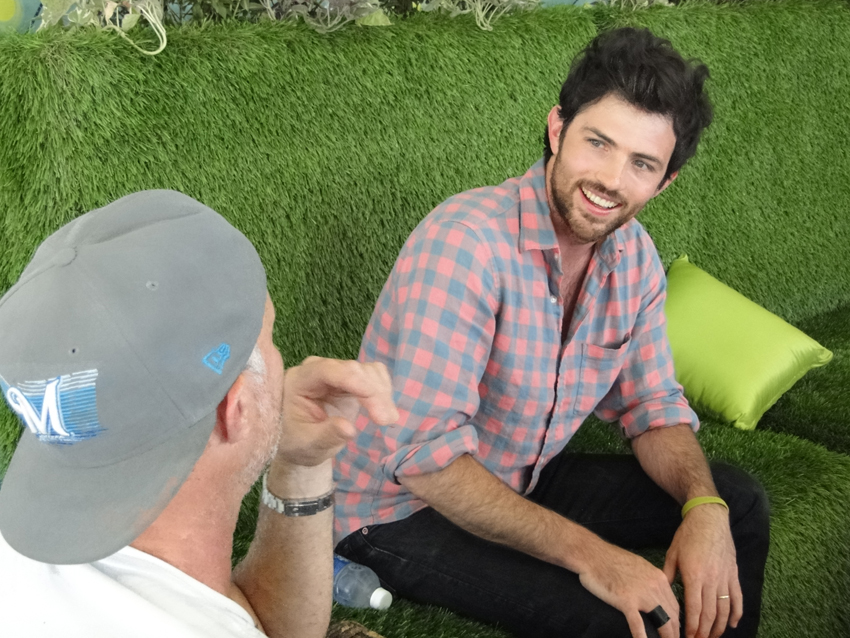
Smith and Scott Avett © Joe Bosso
Chad Smith: This is our territory. It's like a hooker: "This is my corner."
Scott Avett: Right, and they're right on the line. The police officer was like, "Down there's where the line is. Right on the line is as close as they can be to the people or whatever; they've already got their spot staked out."
Seth Avett: We moved on down. The town was crazy. We found this spot, we started playing, and his guy comes up with this clown nose and some paint; everything else was just a total hobo.
Scott Avett: He was grinning.
Seth Avett: He had a blazer with no shirt; he was filthy. He was like... he said his name was like Five-Finger Fred or something. He was like, "Five-Finger Fred, this is his spot, but he's sick right now." He said, I'm gonna let you guys in on a secret. You can play here." I shit you not. He said, "I'll be back for my percentage later."
Chad Smith: [Laughs] He was a pimp! He was pimping you guys - the guy with the clown nose.
Seth Avett: The guy with the clown nose. We said, "OK. We'll do it." He walks off, and Scott and I are standing there like... we started a song, and then we were like, "We need to get out of here. Let's just go. Who knows who he's bringing back. This is just weird."
We went to Seattle and tried to do it again, and you had to have a permit. There are a lot of things about it that are just hard to do.
Chad Smith: Exactly. I see people and they've got their guitar case out …
Seth Avett: Yeah, I guess if you spend time in the towns, you figure out where the ins and outs are.
Scott Avett: We ended up busking at the Grand Canyon. We've got some VHS footage of that. It's wild. We didn't know what we were doing.
Seth Avett: We came back from that, and that's when Bob was like, "Listen, we've got to go on the road if we want to do this." You do that trip; we thought we were just getting something out of our system. We were learning. We drove a lot, and we learned a lot. We came back, and Bob and I both booked a tour on our own in 2002. We started... everywhere we'd go, we'd say, "Well, there were 20 people there."
Bob Crawford: It's funny: We weren't really completely aware... Scott and I weren't, anyway... that you needed a tour to make something happen. We for some reason thought it would come to you, like your living would come to you.
Chad Smith: You've got to go out and get it.
Seth Avett: You've got to go, always, every level. You've got to go out there, and go to the people. Once we first got a taste of it, once we toured, 21 days on the first tour, 14 shows, something like that, it was such a good experience. It was like, "Well, we've got to go back."
Chad Smith: Did you go to the same places? You probably figured it out, right?
Scott Avett: Yeah, started great relationships, yeah.
Seth Avett: Bought a van, bought an RV.
Scott Avett: Fortunately for us, it's been like this ever since.
Chad Smith: That's below grass roots.
Seth Avett: We would Xerox little forms, name, e-mail address, cut them up with scissors, take a cardboard box with a slot in the top: "please write e-mail address"; put them on all the tables in the restaurant and get people to drop them. We'd been building this very piece by piece, the whole time.
Chad Smith: Spectacular.
Scott Avett: It could have gone faster, but we're really lucky that it built. We had a lot of hardship. There'd be nobody in a place. We played at Arlene's Grocery for two friends of ours. We'd watch a punk rock band that had it packed, and they just moved shows in and out at Arlene's Grocery. We'd go in, and everybody cleared out. Two people came in, our friends. We'd play, we'd leave.
Chad Smith: And now, you're playing to 65,000 people.
Scott Avett: You swallow your pride enough, it becomes nourishment.
Seth Avett: We're really thankful for it, man. Quote me. When we have a crowd…
Chad Smith: I think it's really cool, like you say. It would have been maybe nicer or easier if it happened quicker, but…
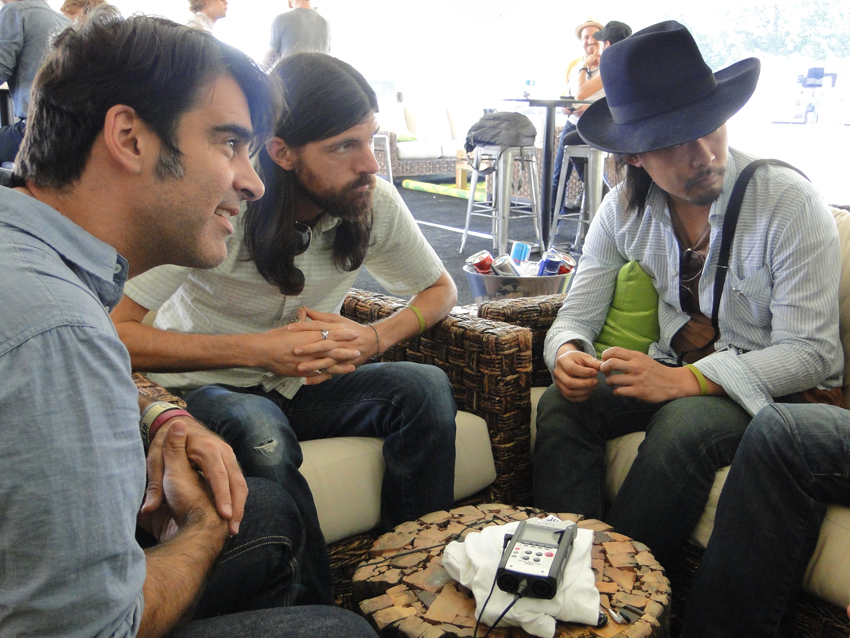
Bob Crawford, Seth Avett and Joe Kwon © Joe Bosso
Scott Avett: In some ways. In other ways, it would have made it more difficult.
Chad Smith: Some of the groups that I know that become popular right away, they band together and they become really popular right away, it's really difficult. My friends in Pearl Jam, they struggled with a lot of…
Scott Avett: Adjustment.
Chad Smith: Adjustment.
Scott Avett: At the highest level.
Chad Smith: We took them on the Blood Sugar tour, and it was us and Smashing Pumpkins. We took two bands, and they needed an opening act. I remember, about a week or two weeks before we were starting, and Jack Irons, who used to be the drummer in the Chili Peppers... he was the original drummer... he was friends with Eddie, the singer. He said... he went to Flea and Anthony and he said, "My friend's a singer on Epic and whatever, and they're looking for a tour."
We listened to them. I remember sitting in the parking lot of our rehearsal place, putting the cassette in - that's how long ago it was - we listened to about 30 seconds of it, and we went, 'Ahh, Jack's friend. We'll take 'em.' I'm not saying it had anything to do with our tour, but I watched it from nothing to Lolapalloza that summer and six months later. That'll really fuck with you, man. There are young guys who have played...I'm so grateful that you guys did, and the Chili Peppers as well.
Seth Avett: You guys had three or four records before …
Chad Smith: I was on the fourth record; Mother's Milk was the fourth record. It was a little gradual thing. Each time, we did a little bit better. But it was more gradual. You're in your 20s, and all of a sudden …
Scott Avett: All these people around you telling you you're great; you don't know how to process it.
Chad Smith: Yeah, and money and everything else that comes along with it. I'm very grateful to hear you guys say that.
Scott Avett: I recently had an interview with this fellow, and he had seen a band recently that has had a much quicker sort of trajectory, saying that this fellow on stage was like, "How in the world did we get here?" He was like, "Did you all ever feel like how in the world did you get here?" I stopped for a second, and I was like, "That thought has never crossed my mind." Because we processed every single step. It was like, "Is it when you're in front of a crowd of 50,000 people?" When we step out there, the thought never crossed my mind - "How did we get here?"
My eyes have been processing this year after year after year. You start with 15 people, and then you see 25 people in front of you, and you see 45 people in front of you, and you see 85 people in front of you. It did take over a decade to get up to those thousands of people. It is great. When I step back, I'm like, "Man, this is really great. It's really cool. I'm really thankful." But my eyes don't have to adjust and say, "OK, this makes sense to me." I'm very thankful.
Seth Avett: We know a couple groups; we're friends with some people that have seen that. It's really just up to them.
Scott Avett: Pearl Jam's a great example. They're veterans now. They figured it out.
Chad Smith: They figured it out, but it was shaky for a while. They did figure it out. I love those guys. It's… I come out, and I play. I'm just happy to be playing [laughs]. I'm sure a lot of people think, "You guys just hit it." With us, it's like mainstream people think "Blood Sugar was your first record, right?" I'm like, "No." They think... I think it's important to stay grounded like that.
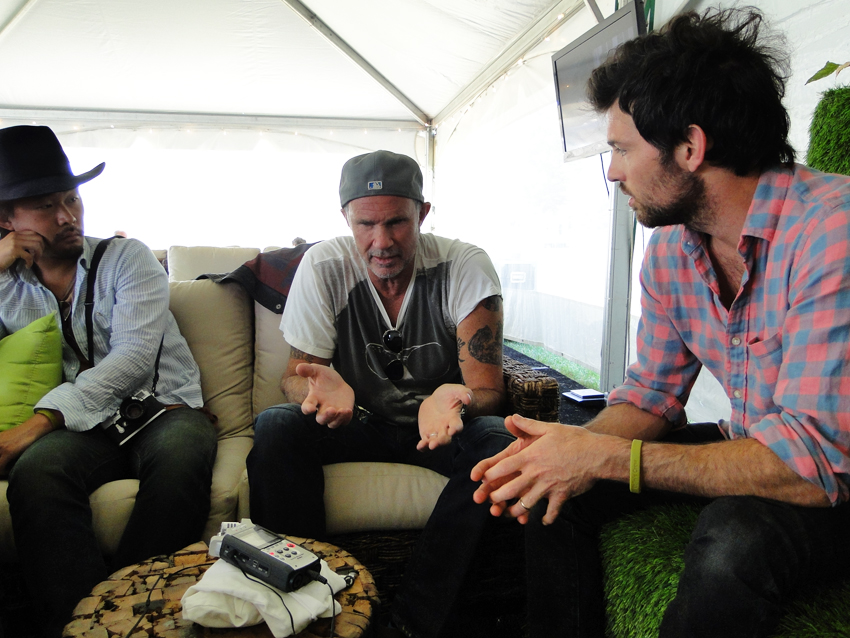
Joe Kwon, Smith and Scott Avett © Joe Bosso
Seth Avett: Luckily for us, we haven't had a lot of choice.
Scott Avett: It helps the music so much.
Chad Smith: Yeah, it's like, "We're doing our thing. Fuck, I love the music." Do what you love to do, go play…
Scott Avett: It's amazing.
Chad Smith: Get around, see people, meet new people.
Scott Avett: How do you guys keep the energy up? Because of our upbringing, Seth and I, like we sometime don't relate. We'll fall into a country or folk rhythm, and some of the guys that we really admire, they're songwriters. What they do, they stand at the microphone. But we move a lot. We watched people like that Anthony Kiedis. We watched those things, we learned from them. We were always imitating it, and we learned our own voice and moves with it. How do you keep up the energy? You guys have to like... Is it like one day at a time?
Chad Smith: I think that the way we perform is the only way that we really can. It's an extension, and I think, watching you guys, I think it's an extension of the feeling you get when you play. Anthony cannot... he's in the studio, he cannot wave his fucking arms around when he sits - he can't. Like, the mic breaks off the stand. He can't not do it. It's just the way... To play the way I play, I have to play hard. 'Why do you gotta play so hard?' I play so hard, that's my feeling of how I want to play those songs. I love it. I think, as you get older, you have to be able to do this crazy shit, and the next day you bounce back. You have to take care of yourself.
Traveling and all that... we're not crazy about it, but it's like you have to do what you need to do to be able to perform. We want to perform at the highest level. We want people to come out and see us play, and we're very... a lot of pride in it, the live performance, and we want to do really well. Physically, it's very athletic, what we do - what we all do. You know, whatever you have to do to be able to do that. It's important. I don't want to be like, "I'm winded" an hour into the show. That's the last thing you need.
I'm going to let myself down, I'm going to let the other guys down, and I'm going to let the audience down. They paid their fucking sixty, eighty bucks or whatever. They could spend their money in a lot of other places. I just want to have that, and to be able to do that. I've got to keep delivering, and keep doing it. Thank God there's no drug testing in rock and roll.
Scott Avett: Many great bands would be stopped in their tracks well before they make their best work, that's for sure [laughs].
Chad Smith: The Stones would have been gone a long time ago.
Seth Avett: They would have never started.
Chad Smith: Lots of them. The drug thing, I've had my share - I'm not going to sit here and preach about that. You can do whatever. I just don't want anybody to hurt themselves or hurt somebody else. At this point, it's like I can't do some of the things I used to do. It just doesn't work for me anymore.
Seth Avett: We're in this scenario right now; great hang-out spot, people around having beers, having a great time. Scott was saying earlier, he was like, "Man, those guys over there got wired - having some beers, grilling out." I'm 32 years old, and if I drink a beer right now, it would affect me negatively to play tonight. We're so focused on the show at this point.
For us, the party is not that far in our rearview. We're a band now for almost 12 years, lingering on that. We didn't really cut the drinking way, way, way down until 2007 or '08. We had to, because we weren't in like fistfights, but Scott and I would occasionally have these absolute arguments, over nothing whatsoever. It was always after drinking.
We're very lucky that only five or six years in we were like, "OK, we need... this is not working." We see ourselves as lifers, if we want to be. We're artists, we want to be able to speak towards possibly a legacy type deal. We're going to make records for as long as we want to make them. We want that decision to be in our court, not in the court of…
Scott Avett: Jack Daniels. [Laughs]
Seth Avett: Jack Daniels or whatever.
Chad Smith: It's true. See, some people don't get it. It takes them a while.
Seth Avett: It depends. For some folks, it's a disease. I'm thankful to say that for me, it's not a disease. I've got close friends where it is a disease. It's not like just one night, "You know what? We need to cut the drinking way back." For some, it's like, "I've got to cut the drinking way back. I've got to go and talk to somebody, you know?" There's ways to help that. We've been lucky to sort of reassess that and get that in a better place.
Joe is a freelance journalist who has, over the past few decades, interviewed hundreds of guitarists for Guitar World, Guitar Player, MusicRadar and Classic Rock. He is also a former editor of Guitar World, contributing writer for Guitar Aficionado and VP of A&R for Island Records. He’s an enthusiastic guitarist, but he’s nowhere near the likes of the people he interviews. Surprisingly, his skills are more suited to the drums. If you need a drummer for your Beatles tribute band, look him up.
